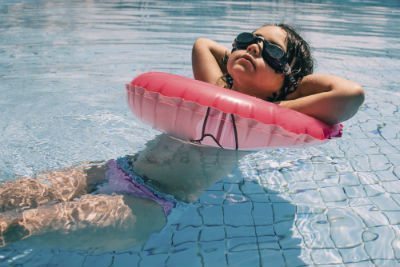Summer is a time for outdoor games, splashing in the pool, and spending long days in the sun. Yet summer is also a long stretch of time without consistent academic instruction. During this time, many students lose up to several months’ worth of reading, writing, and math skills. Help your child prevent summer “brain drain” while still enjoying the summer with the ideas detailed below. 
Plan an activity day
There are so many fun “excursions” to take over the summer–trips to amusement parks, zoos, museums, boardwalks, and the like. Have your child research and plan each activity, while developing important academic skills. She can start by searching the web for nearby options. She might decide on a local history museum, for instance, with interesting exhibits and shows. Before starting your adventure, have her plan a budget, including admission fees, costs for snacks and lunch, fees for any additional shows, and perhaps even the cost of the gas required to get there. To build time management skills, have her map out a time schedule, including the time you should leave as well as pre-determined times for shows, exhibits, and lunch. When you get home, you may even have her write a summary of her favorite parts of the museum and whether or not she would recommend it to a friend.
Write daily
During the summer, to prevent regression in writing skills, students should write every day. This writing can come in various forms. You may give your child a daily writing prompt, for instance, and have him keep a summer journal. Such prompts may include: “Describe your favorite vacation,” “If you could be a land animal, which one would you be and why?” or “Would you ever want to travel to outer space? If so, why?” You can also try matching your child with a pen pal–a friend, family member, or someone with a shared interest, and have him write weekly letters to his pen pal sharing his summer adventures. The key is to write regularly and consistently.
Create your own science project
You can bring science to life over the summer with engaging and stimulating science projects. Try planting a garden with your child, for example, to teach many valuable skills. Start by having her decide which plants or flowers will be in the garden. Once she plants the seeds, have her predict (and write down) what she thinks will happen next and what she needs to do to ensure that the plants will grow. As the plants grow, have her track their growth and later create a visual chart, including dates and specific changes. She can even create a write-up detailing her observations and whether or not her predictions came true.
Take your child grocery shopping
Combine the fun of shopping with the excitement of learning by taking your child to the supermarket. Based on your family size, have him predict how many items you will need for a given week. For instance, you may need two boxes of pasta, one pound of salmon, one box of cereal, and so on. Based on these amounts and the cost per item, have him try to figure out how much the grocery bill will come to (without any last-minute add-ons), then compare it to the actual cost to see if his prediction was correct. For younger kids, have them find certain quantities (4 apples or 6 oranges), or items of a certain shape (round fruits) or color (red vegetables).[gravityform id=”13″ title=”false” description=”false” ajax=”true”]
Build a bird feeder
Help your child strengthen her critical thinking and fine motor skills (amongst other key skills) by building a bird feeder. To build a basic one, you’ll need just three items: a cardboard toilet paper roll, peanut butter, and bird seed. Have your child predict what she thinks she may need to do with these items to make the bird feeder. Discuss her predictions, then get started. Using a spoon, have her spread a generous layer of peanut butter all around the cardboard roll. The more peanut butter you use, the more the seeds will stick. Then roll it around in the seeds and slide the roll onto a branch. Watch the birds flock to your feeder!
Summer is certainly a time for relaxation and fun. However, it is also a time when key academic skills can fall to the wayside. Try these activities to engage your child and prevent the all-too-common summer brain drain.
Dr. Emily Levy is the founder of EBL Coaching, a tutoring program that specializes in one-on-one home and on-site instruction for students in grades preK-12 in NYC and NJ. She is also the author of Strategies for Study Success, a study skills workbooks series emphasizing test taking, note taking, reading comprehension, writing, and summarizing strategies, and the Flags and Stars Orton Gillingham student workbook series. These workbooks are currently used at schools nationwide. To learn more about Emily Levy and EBL Coaching, visit eblcoaching.com!













